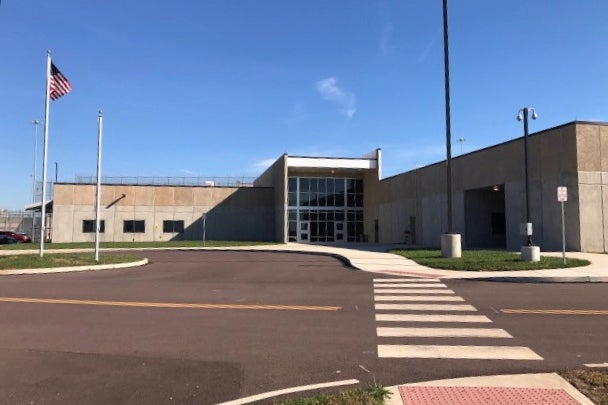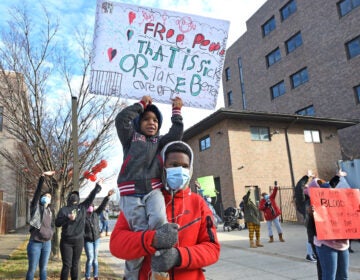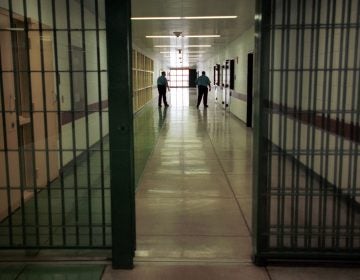Pa. prison system mulls releasing hundreds to prevent coronavirus spread
The Pennsylvania Department of Corrections is considering releasing hundreds of prisoners to help prevent the spread of COVID-19 within the system.

State Correctional Institute (SCI) Phoenix. (Pennsylvania Department of Corrections)
Amid concerns from advocates and state corrections officers, Pennsylvania’s Department of Corrections is discussing the possibility of releasing hundreds of prisoners to help prevent the spread of COVID-19 within the system. Two people incarcerated in a Montgomery County prison have now tested positive for the virus.
Both cases are men serving sentences at State Correctional Institute (SCI) Phoenix. The second man was diagnosed with coronavirus late last night, just days after the first case was announced.
“We don’t have any positive cases anywhere else,” said Secretary of Corrections John Wetzel during a call with reporters on Wednesday.
Four prison staffers have also tested positive for COVID-19. Wetzel would not say in which facilities they work.
Pennsylvania has 25 state prisons housing roughly 45,000 people, all of whom have been under quarantine since late Sunday, with their movements restricted and meals served inside cells.
Wetzel said Wednesday there are roughly 1,100 people currently sitting in state prisons for nonviolent crimes who have served their minimum sentences, but have yet to have a parole hearing. Roughly 600 are behind bars for technical parole violations and have not been charged with a new crime, he said.
Those released would be sent to a halfway house, or potentially be placed on house arrest.
Those considered by health officials to be most at-risk for contracting COVID-19, including people who are immunosuppressed, would likely be released first. Wetzel said his department has enough tests at the moment, saying “we’re where we need to be today,” but added there are roughly 12,000 people in state prisons — about a quarter of the prison population — who the CDC would consider medically “vulnerable” for coming down with COVID-19.
The department is testing individuals based on CDC guidelines, including people who have visible symptoms of the disease, which include a high fever, shortness of breath, and a dry cough.
“We’re still exploring options,” said Wetzel, adding that he is in talks with Senate lawmakers, the state’s Office of Victim Advocate, and the Pennsylvania District Attorneys Association.
Any release plan would require state lawmakers to pass a bill authorizing it. And it will be up to them to decide whether such a bill is necessary to slow the spread of COVID-19 inside the state’s prison system.
The House and Senate are back in session next week.
If a law does pass, the Pennsylvania Board of Probation and Parole would consider incarcerated people for release on a case-by-case basis.
Commonwealth Victim Advocate Jennifer Storm is behind the idea, but wants the bill to have a provision that would block people with a history of domestic violence from being released early, especially on house arrest.
“At a moment of international crisis, we don’t want to add additional crisis, trauma and anxiety into a population unnecessarily,” said Storm.
In March, the system released 574 people. It’s unclear how many were released due to concerns over the spread of COVID-19.
The majority of people in Pennsylvania’s state prisons share a 100 square-foot cell with another person. Under the system’s quarantine plan, they are now taking their meals in their cells and will be “provided with in-cell programming,” according to the department.
Video and phone calls will still be allowed to take place outside of the cells as face-to-face visitations continue to be suspended.
Wetzel said prisoners are now traveling in groups of 10 or less. Before the quarantine plan, that number was 50.
New arrivals are being quarantined for 14 days at SCI Retreat, a facility near Wilkes-Barre that was slated for closure.
All employees and contractors must pass a medical screening, which includes a questionnaire and temperature-taking, before entering a prison. They must also wear masks over their faces while they’re inside.
Crews are cleaning each facility three times every eight hours instead of once per shift.
The DOC has not publicly shared its general pandemic plan, but Wetzel said it does not call for pre-screening staffers, temperature-taking, or mask-wearing, adding that he doesn’t see any of those new protocols changing before June.
“I would be stunned if that happened,” he said.
WHYY is your source for fact-based, in-depth journalism and information. As a nonprofit organization, we rely on financial support from readers like you. Please give today.





![CoronavirusPandemic_1024x512[1]](https://whyy.org/wp-content/uploads/2020/03/CoronavirusPandemic_1024x5121-300x150.jpg)


